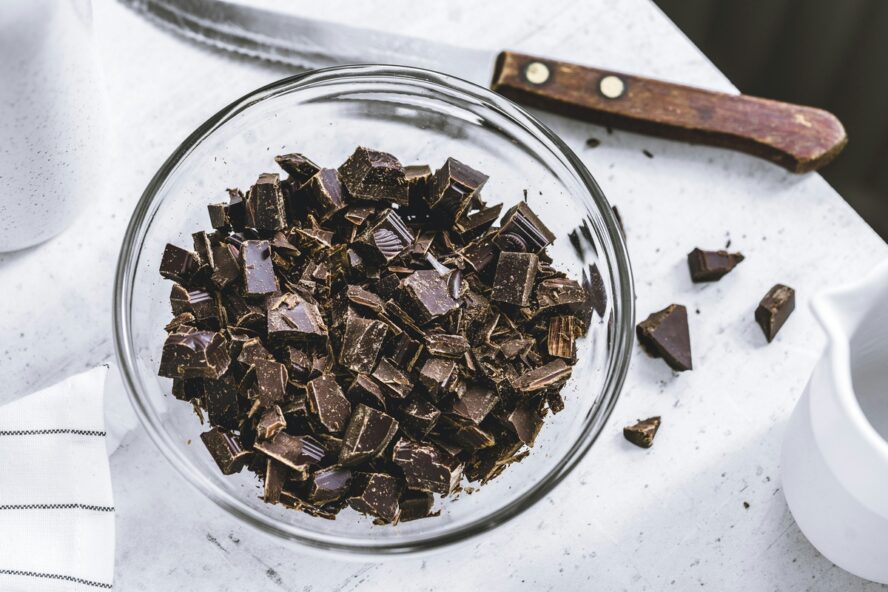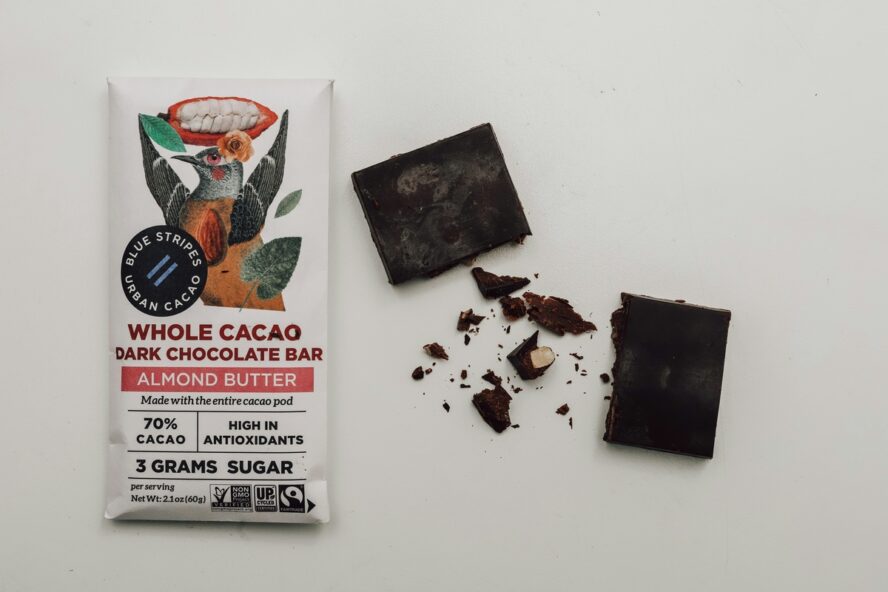
Staying healthy can still be sweet with dark chocolate. Dark chocolate provides a unique blend of antioxidants that help support both the brain, heart, and gut, to mention just a few ways your body can benefit. Studies are even starting to show some benefits to women’s health by consuming just a few squares of dark chocolate daily.
To give you a better sense of how you can enhance your health (and taste buds!) with dark chocolate, we’ll dig into dark chocolate nutrition facts, evidence-based research, and even debunk common myths. And if you’re not sure where to start on your dark chocolate journey, we’ll provide advice on how to choose the best dark chocolate for you and how much to eat per day for optimal health.
Dark Chocolate: A Nutritional Powerhouse
Before we dive into all of the health benefits, here’s a rundown of the basic dark chocolate nutrition facts1.
| Nutrients | 1 oz of Dark Chocolate (70-85% cacao solids) |
| Calories | 170 |
| Protein | 2.2 grams |
| Total fat | 12.1 grams |
| Polyunsaturated fat | 0.357 grams |
| Monounsaturated fat | 3.63 grams |
| Total carbohydrate | 13 grams |
| Total fiber | 3 grams |
| Sugar | 6.8 grams |
| Calcium | 20.7 milligrams |
| Iron | 3.37 milligrams |
| Phosphorus | 87.3 milligrams |
| Potassium | 203 milligrams |
| Sodium | 5.67 milligrams |
| Zinc | .938 milligrams |
| Beta-carotene | 5.39 micrograms |
| Lutein/zeaxanthin | 7.66 micrograms |
| Caffeine | 22.7 milligrams |
| Theobromine | 22.7 milligrams |
8 Evidence-Based Health Benefits of Dark Chocolate

So, is dark chocolate good for you? The answer is yes, in a number of ways! We already loved dark chocolate just on taste alone, so this news is a huge win. Here are 8 different ways your dark chocolate habit could actually be supporting your health.
This is not a substitute for professional medical advice. See your primary care physician when making changes to your lifestyle.
1. Cardiovascular Health
Many of dark chocolate’s health benefits stem from its high antioxidant content. Research shows that dark chocolate contains an array of bioactive compounds like polyphenols, including beneficial plant-derived flavonoids. It also features a range of methylxanthines (also plant-derived compounds, but with stimulatory effects) like theobromine and caffeine2.
These compounds hold potent health-promoting properties that can help reduce risk of heart disease over time. A 2022 study in the journal Foods shows that cocoa intake for ≥2 weeks was linked with reductions in both systolic and diastolic blood pressure3.
Furthermore, a 2021 study in the American Journal of Clinical Nutrition found that regular intake of chocolate resulted in a lower risk of coronary artery disease (CAD), which is also thought to be related to its flavonoid content4.
Plus, if you’re an athlete or a runner, there’s even more to gain. A 2025 article in the journal Sports Medicine-Open reports that supplementing your diet with 85% cacao dark chocolate may help lower the negative vascular effects of high-intensity resistance exercise by reducing blood pressure, arterial stiffness, and arterial pressure volume index, especially in the early follicular phase5. And a 2024 study in the journal Sports shows that dark chocolate can improve arterial function in endurance runners, which can help enhance vascular health6.
2. Brain Function and Cognitive Performance

Could dark chocolate help you concentrate? A 2024 scientific review in the textbook “Nourish your Mind: A Scientific Approach to Brain Health” discusses how dark chocolate can enhance cognitive function, memory, and mood through its antioxidant content, which helps combat harmful free radicals that can damage cells7.
Similarly, a 2022 study in the journal Behavioural Neurology shows that dark chocolate intake can help reduce fatigue, which can indirectly support cognitive function8. And another 2024 study in the journal Heliyon reports that a single intake of high concentration cacao can help contribute to the maintenance of cognitive performance and concentration during continuous and demanding tasks9. Further research reports that high cacao concentrations work better than low cacao concentrations at enhancing cognitive efficiency10.
3. Mood Enhancement and Stress Reduction
Chocolate has always been considered a comfort food due to its sweet taste and creamy texture. But dark chocolate is more than just comforting — it’s actually proven to help reduce stress and enhance your mood. A 2025 study in the European Journal of Cardiovascular Medicine reports that dark chocolate may be able to lower levels of the stress hormone, cortisol11. This is thought to be from its flavonoid content, which can improve blood flow and reduce vascular resistance (although we personally think the delicious chocolate also has something to do with the mood boost).
Studies also show that dark chocolate can help increase levels of the feel-good hormone serotonin in the brain12. A 2022 study in the journal Critical Reviews in Food Science and Nutrition goes as far as to say that regular intake of a cocoa-rich product can even help minimize symptoms of anxiety and depression13.
By that logic, regular dark chocolate intake could help you manage a busy life. The stress-managing effects of dark chocolate can be further enhanced by incorporating other beneficial dietary habits like eating more antioxidant-rich fruits, vegetables, and spices, as well as taking daily pre- and probiotics to support the gut-brain axis14.
4. Gut Microbiome Support for Better Digestion
Speaking of the gut-brain axis — a 2022 study in the Journal of Nutritional Biochemistry shows that dark chocolate can also improve negative emotional states by improving gut microbial diversity15.
A 2025 scientific review in the journal Processes shows that intake of dark chocolate has two distinct digestive health benefits16. First, dark chocolate can help improve constipation and help people have more regular bowel movements. Second, the prebiotic qualities of dark chocolate can help good bacteria in your intestines thrive and multiply. More specifically, it helps promote the growth of certain bacteria that produce a substance called butyrate, which supports a diverse and healthy digestive system.
5. Blood Sugar Regulation and Insulin Sensitivity

Through its antioxidant content, dark chocolate can also help support blood sugar regulation and insulin sensitivity2. A 2024 study in the journal BMJ shows that increased intake of dark chocolate was linked with lower risk of type 2 diabetes17. The study also found that participants who consumed ≥5 servings of dark chocolate per week showed a 21% lower risk of type 2 diabetes.
Note that these benefits did not apply to milk chocolate — in fact, an increased intake of milk chocolate was linked with long-term weight gain, likely due to its higher fat and sugar content.
6. Anti-Inflammatory Effects Throughout the Body
Beyond these specific brain, heart, and digestive health enhancements, dark chocolate can also provide more general anti-inflammatory effects to enhance overall health. A 2025 study in the European Journal of Microbiology and Immunology reports that the antioxidants in dark chocolate could help reduce oxidative stress responses in vascular diseases including atherosclerosis, hypertension, as well as metabolic conditions like obesity and type 2 diabetes, celiac disease, chronic kidney diseases, and polycystic ovary syndrome18.
Dark Chocolate Benefits for Women’s Health
As if those weren’t enough reasons to start stocking up, it’s also worth mentioning that dark chocolate offers some specific benefits for women. Feel free to use these as an argument for why you deserve the last piece of chocolate the next time your partner, son, uncle, coworker, etc. reaches for it.
7. Reducing Fatigue During Different Life Stages
Dark chocolate could be the answer to variable moods and fatigue as women transition to menopause. A 2023 study published in the journal Nutrients explored the effects of a flavanol-rich cacao extract on middle-aged women who had reported being fatigued and stressed19. After eight weeks of study conducted on both a cacao group and a placebo group, they found that the change in the index of positive mood was significantly higher in the cacao group. Similarly, indicators of negative mood and total mood disturbance were significantly lower in the cacao group.
These results suggest that cacao flavanols can improve mood and increase vigor in middle-aged women to help counteract menopausal symptoms that often decrease quality of life.
8. Iron Content for Menstruating Women

A 2025 study in the journal Nutrients shows that short-term dark chocolate intake may help support recovery and performance as well as cognitive accuracy in trained female athletes, particularly during hormonally sensitive phases like pre-menstrual syndrome (PMS)20. These benefits are thought to be due from the iron, magnesium, and omega-3 content of dark chocolate.
Furthermore, the iron in dark chocolate can better help women meet their iron needs daily (around 11 mg). One ounce of dark chocolate contains about 2 milligrams of iron, roughly 11% of the recommended daily value. More specifically, dark chocolate is also a good source of non-heme iron, which can reduce a woman’s risk of iron deficiency anemia21.
How to Choose and Consume Dark Chocolate Safely
Now that we’ve addressed all the benefits, you might be tempted to run straight to the grocery store. But before you do, there are still a few considerations to keep in mind to take advantage of dark chocolate’s benefits.
Cacao Percentage Matters More Than You Think
When it comes to the nutritional value of dark chocolate, the percentage of cacao is everything. All the antioxidant value lies in the cacao — so a bar that’s only 30% cacao doesn’t offer nearly as many antioxidant benefits as an 85% cacao bar. Not only that, but a higher cacao percentage also means less fat and sugar.
If you’re a dark chocolate newbie, we recommend choosing a bar with at least 70% cacao solids for an optimal balance of both palatable taste and health benefits. Higher cacao percentages will have a more potent and bitter taste which may be off-putting to some. But if you do prefer something with a bitter kick, feel free to go higher with your cacao content!
How to Avoid Heavy Metals
You may have heard that some dark chocolate contains traces of heavy metals, as they can accumulate in the soil and be absorbed by cacao beans. This is certainly something to be aware of when eating dark chocolate, but it likely isn’t an issue as long as you don’t overdo it.
A 2024 study in Frontiers in Nutrition tested 72 dark chocolate and cocoa products in the US for heavy metal contamination with lead, cadmium, and arsenic22. More than 97% of the tested products fell below the FDA’s established limits for lead, and the median concentrations of each metal tested were lower than the conservative Prop 65 maximum allowable dose levels. Overall, the study indicated that heavy metal contamination likely doesn’t pose an appreciable risk for the average person when consumed as a single serving.
However, many tested products did contain small amounts of heavy metals, so it’s smart to proceed with caution. This is especially true when we consider that we may be exposed to other sources of heavy metals throughout the day, which could add up to higher-than-recommended levels when combined.
Notably, organic products were more likely to show higher levels of cadmium and lead. For a dark chocolate product with the lowest levels of heavy metals, choose those where the cacao originated from regions like West Africa and Asia rather than Central and South America23. We recommend researching individual brands to get the best sense of possible heavy metal content.
How to Read Dark Chocolate Labels

To find the highest quality dark chocolate, look at the label for special indicators like:
- Single origin
- Certifications like Fairtrade or Rainforest Alliance that show the dark chocolate has been responsibly produced (you can also look for Organic labels here, although you should be mindful of heavy metal content)
- Minimal to no additives
Integrating Dark Chocolate into Your Diet
If you’re sold on eating more dark chocolate, let’s get into the details of how to successfully add it to your diet.
Optimal Serving Sizes and Timing
Most experts suggest that around one ounce (30 grams) of dark chocolate daily is ideal for reaping the benefits while keeping calories and sugar intake in check15.
There is no optimal time of day to eat dark chocolate — you should simply consume it when it feels best for you. For example, have a piece of dark chocolate in the morning if you need a mood boost, in the afternoon if you want to indulge in a sweet snack, or in the evening or during stressful moments to help induce a calm mind and body.
The antioxidants and nutrients from dark chocolate can provide a healthier alternative to other sweets and candies when you’re having sugar cravings, so you can also approach it as a direct swap for a sweet you want to cut out.
Pairing Strategies for Maximum Nutrient Absorption

For optimal nutrient absorption, pairing certain foods can help you unlock more benefits. Try pairing dark chocolate with foods rich in vitamin C, like citrus fruits or berries. Vitamin C helps the body better absorb the iron in cacao, supercharging your snack (plus, who doesn’t love chocolate and orange?)24.
You can also pair dark chocolate with nuts, which provide a good source of protein and healthy fats that can help slow blood sugar absorption. Finally, pairing dark chocolate with other antioxidant-rich food and drinks like green tea can enhance its heart health benefits.
Dark Chocolate Recipe Ideas
The applications of dark chocolate are endless — some of our favorite easy dark chocolate recipes include:
Addressing Myths and Concerns
Despite dark chocolate’s many benefits, it’s not a miracle food! Be wary of anyone who suggests it can work magic — here are some specific claims and concerns to be aware of.
Dark Chocolate and Weight Management
Although dark chocolate can easily be incorporated as part of a healthy weight management program, there isn’t much research showing that it can help provide significant weight loss. While some of its qualities may support a larger weight loss journey (like its ability to help improve your body’s sensitivity to insulin), it shouldn’t be relied on as a weight loss solution.
Although we’re busting this myth overall, we can understand where it came from — there are certain studies that do explore some promising effects of dark chocolate on appetite suppression and energy expenditure. For example, a 2025 study in the International Journal of Exercise Science that shows that dark chocolate supplementation in postmenopausal women was linked with a significant 3.2% increase in resting energy expenditure25. Another study conducted on 12 young women saw decreases in appetite and reduced levels of ghrelin, a hunger-stimulating hormone, after smelling and eating dark chocolate26. However, more studies need to be done before definitive conclusions can be drawn.
Caffeine Content
Each ounce of dark chocolate contains around 23 milligrams of caffeine, which is roughly equivalent to the caffeine found in a cup of green tea27. If you’re sensitive to green tea, then you’ll likely want to avoid consuming dark chocolate close to bedtime as it may make it hard for you to fall asleep.
When to Avoid Dark Chocolate

Although dark chocolate has beneficial properties for the majority of the population, some people may want to avoid eating dark chocolate, such as:
- Pregnant women
- Children
- Those with kidney disease, or those who are prone to kidney stones (due to dark chocolate’s oxalate content)
- Acne-prone individuals
- People prone to acid reflux
- Individuals allergic to cocoa or milk
- Those taking certain medications such as MAO inhibitors used to treat depression, as dark chocolate may enhance blood pressure-lowering effects
Frequently Asked Questions
Yes, the magnesium and mood-boosting compounds may help reduce cramping and irritability.
Although quality dark chocolate is generally safe for pregnant women in moderation (1 oz/day), it’s always best to consult your healthcare provider and err on the side of caution.
Consumer Reports found that Ghirardelli, Mast, Taza, and Valrhona tested for levels lower than California’s maximum allowable dose levels (MADLs). Brands like Trader Joe’s, Lindt, Dove, Chocolove, Tony’s, and Hershey’s tested above the MADLs for either lead or cadmium.
Yes! Studies show dark chocolate can reduce cortisol levels and improve stress response.
Dark chocolate alone should not cause weight gain when consumed in moderation, as part of a balanced whole foods diet. It can, of course, cause weight gain if eaten in excess, due to its higher calorie and sugar content.
Cacao is raw, cocoa is processed. Both offer health benefits, but cacao retains more nutrients.
Always check with your primary health care provider. Dark chocolate may help reduce insulin sensitivity, but portion control is crucial.
Sources:
- https://fdc.nal.usda.gov/food-details/170273/nutrients
- https://pmc.ncbi.nlm.nih.gov/articles/PMC9589144/
- https://pmc.ncbi.nlm.nih.gov/articles/PMC9265772/
- https://pmc.ncbi.nlm.nih.gov/articles/PMC8412179/
- https://pmc.ncbi.nlm.nih.gov/articles/PMC12008093/
- https://pmc.ncbi.nlm.nih.gov/articles/PMC11679228/
- https://www.researchgate.net/publication/388582212_The_Neurobiological_Effects_of_Chocolate_Consumption_A_Scientific_Review
- https://pmc.ncbi.nlm.nih.gov/articles/PMC9767741/
- https://pmc.ncbi.nlm.nih.gov/articles/PMC10803911/
- https://www.mdpi.com/2072-6643/16/1/41
- https://healthcare-bulletin.co.uk/article/stress-reducing-effect-of-a-single-dose-of-dark-chocolate-in-healthy-individuals-an-assessment-using-heart-rate-variability-2891/
- https://pmc.ncbi.nlm.nih.gov/articles/PMC9370573/
- https://pubmed.ncbi.nlm.nih.gov/33970709/
- https://pmc.ncbi.nlm.nih.gov/articles/PMC10384867/
- https://www.sciencedirect.com/science/article/pii/S0955286321002746?via%3Dihub
- https://www.mdpi.com/2227-9717/13/5/1431
- https://www.bmj.com/content/387/bmj-2023-078386
- https://pmc.ncbi.nlm.nih.gov/articles/PMC12208183/
- https://pmc.ncbi.nlm.nih.gov/articles/PMC10490061/
- https://pmc.ncbi.nlm.nih.gov/articles/PMC12029999/
- https://pmc.ncbi.nlm.nih.gov/articles/PMC12237530/
- https://pubmed.ncbi.nlm.nih.gov/39144282/
- https://www.sciencedirect.com/science/article/pii/S0963996924004307
- https://ods.od.nih.gov/factsheets/Iron-HealthProfessional/
- https://pmc.ncbi.nlm.nih.gov/articles/PMC11970407/
- https://pubmed.ncbi.nlm.nih.gov/20102728/
- https://pmc.ncbi.nlm.nih.gov/articles/PMC9608580/

